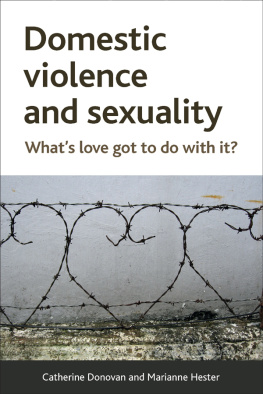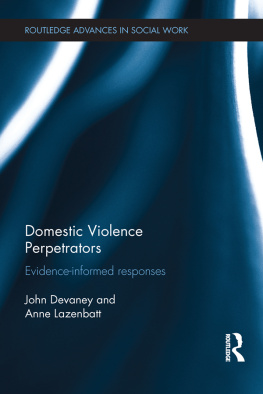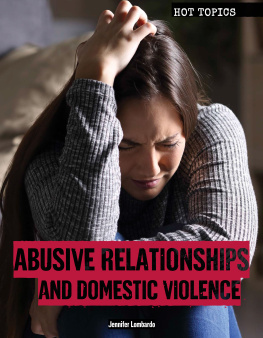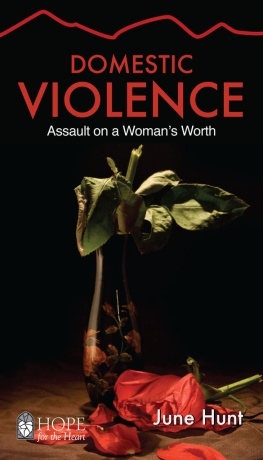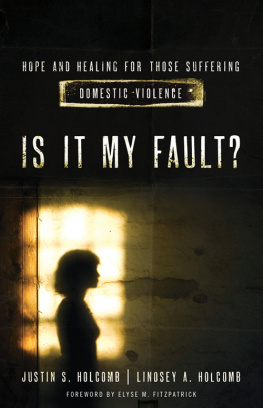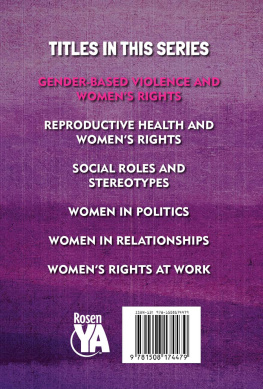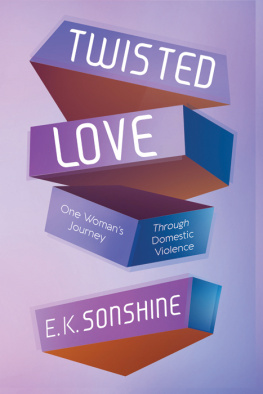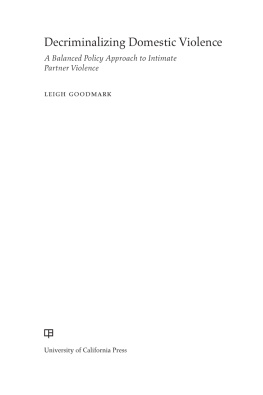DOMESTIC VIOLENCE AND
SEXUALITY
Whats love got to do with it?
Catherine Donovan and Marianne Hester
First published in Great Britain in 2014 by
Policy Press University of Bristol 6th Floor Howard House Queens Avenue Clifton Bristol BS8 1SD UK Tel +44 (0)117 331 5020 Fax +44 (0)117 331 5367 e-mail
North American office: Policy Press c/o The University of Chicago Press 1427 East 60th Street Chicago, IL 60637, USA t: +1 773 702 7700 f: +1 773-702-9756
Policy Press 2014
British Library Cataloguing in Publication Data
A catalogue record for this book is available from the British Library
Library of Congress Cataloging-in-Publication Data
A catalog record for this book has been requested
ISBN 9781447320951 ePUB
ISBN 9781447320968 Kindle
The rights of Catherine Donovan and Marianne Hester to be identified as authors of this work has been asserted by them in accordance with the Copyright, Designs and Patents Act 1988.
The authors and publisher gratefully acknowledge the permission granted to reproduce the copyright material in this book. All reasonable efforts have been made to identify the holders of copyright material and to obtain permission for use. In the event of any error or omission, please contact the publisher so that a correction can be incorporated in future reprints or editions of the book.
All rights reserved: no part of this publication may be reproduced, stored in a retrieval system, or transmitted in any form or by any means, electronic, mechanical, photocopying, recording, or otherwise without the prior permission of Policy Press.
The statements and opinions contained within this publication are solely those of the editors and contributors and not of the University of Bristol or Policy Press. The University of Bristol and Policy Press disclaim responsibility for any injury to persons or property resulting from any material published in this publication.
Policy Press works to counter discrimination on grounds of gender, race, disability, age and sexuality.
Cover design by Qube Design Associates, Bristol
Front cover: istockphoto.com
Readers Guide
This book has been optimised for PDA.
Tables may have been presented to accommodate this devices limitations.
Image presentation is limited by this devices limitations.
Contents
List of figures and tables
Figures
Tables
About the authors
Catherine Donovan is Professor of Social Relations at the University of Sunderland, UK, and leader of CASS, the Centre for Applied Social Sciences. She has conducted (mainly qualitative) research in lesbian, gay, bisexual and, latterly, trans (LGBT) communities for over twenty years. With Jeffrey Weeks and Brian Heaphy she conducted the first comprehensive study of families of choice in the UK (Same sex intimacies: Families of choice and other life experiments, 2001, Routledge). Her current research, in collaboration with Rebecca Barnes, focuses on those who have behaved in ways that could be labelled abusive. Catherine is on the board of Broken Rainbow, the charity providing support for victims and survivors of LGBT domestic abuse, and on the steering group of NEDAP (North East Domestic Abuse Project), a regional development project promoting best practice for LGB and/or T people experiencing domestic violence and abuse. She has also worked with the Northumbria Probation Service to develop their Solo Enhanced one-to-one module for abusive LGB and/or T partners. Catherine has also conducted research with John Clayton and Jacqui Merchant on the impact of austerity in the North East of England, specifically the ways in which the rhetoric of localism and the big society are experienced in reality in the voluntary sector and the emotional impact of austerity on practitioners and volunteers.
Marianne Hester is Professor of Gender, Violence and International Policy at the University of Bristol, UK, and heads the Centre for Gender and Violence Research. She is a leading researcher of gender-based violence and has directed ground-breaking research in the UK, Europe, China and Scandinavia (using a range of methods) including historical and theoretical work (Lewd women and wicked witches, 1992, Routledge) and, with Lorraine Radford, the first major study in the UK on child contact and domestic violence (Mothering through domestic violence, 2006, Jessica Kingsley). Current research projects include: male domestic violence victims and perpetrators accessing the health service; rape and the criminal justice system; and domestic violence perpetrator programmes across Europe. She has worked closely with government departments and non-governmental organisations, as expert advisor to the NICE (National Institute for Health and Care Excellence) Programme Development Group on preventing and reducing domestic violence, as Research Director to the Department of Health and National Institute for Mental Health, as specialist advisor to the Home Affairs Select Committee and as NSPCC (National Society for the Prevention of Cruelty to Children) Professor of Child Sexual Exploitation. She was awarded an OBE in 2012 in recognition of her research and prevention of domestic violence. She is patron of Devon Rape Crisis and South Tyneside Womens Aid.
Acknowledgements
The research was funded by the Economic and Social Research Council grant RES-000-23-0650. It was informed by an advisory group consisting of representatives from Broken Rainbow, the Northern Rock Foundation, Northumbria Probation Service, University of Portsmouth Equalities Unit, Central Manchester Womens Aid, Glasgow Womens Library, Scottish Equality Network, Stonewall Cymru, and Devon and Cornwall Police.
We want to thank all who worked on the research project, and in particular Jonathan Holmes and Melanie McCarry who carried out much of the fieldwork, Eldin Fahmy who did the statistical analysis for , our many project administrators but most especially, Jennifer Sewell and Jo Tyler; and latterly to Paula Willerton for her work on the bibliography and proofreading. The research would not have been possible without the active support of the many LGBTQ organisations and equalities networks across the UK who helped to distribute the survey via their members and websites and to develop the interview sample.
Catherine would like to thank Melissa Girling for her love and support during the research and writing of the book. Marianne would like to thank Rosemary Schonfeld for all her love, support and useful insights throughout the writing of this book and during the research on which the book is based.
We want to dedicate the book to all of those lesbians, gay men, bisexual and/or queer women, trans people, and heterosexual women and men who took part in the research and who shared their experiences with us.
ONE
What is the problem?
This book
In this book we provide the most detailed discussion so far in the UK of domestic violence and abuse (DVA) in same sex relationships, based on a large-scale study involving a national survey, interviews and focus groups. Given the lack of research on DVA in same sex relationships we set out to develop a study which also allowed comparison of the experiences of such behaviour across heterosexual and same sex relationships. As the book is largely about experiences of individuals in same sex relationships, the focus is mainly on those identifying as lesbian and gay men. However, we are also able to move beyond the limitations of looking only at lesbian, gay male or heterosexual experiences of DVA to make comparisons between these groups. Where possible we also refer to experiences of bisexual or transgendered individuals, a small number of whom took part in our research. When we discuss the social networks and/or communities that those living in same sex relationships are connected with or belong to we refer to lesbian, gay, bisexual, trans and queer (LGBTQ) communities. Finally, we use the term same sex, while acknowledging that more recently, especially in North America this term has been superseded by the term same gender. We use same sex partly because this is the language we adopted in the research and partly because it is still the term most often used in the UK context.


